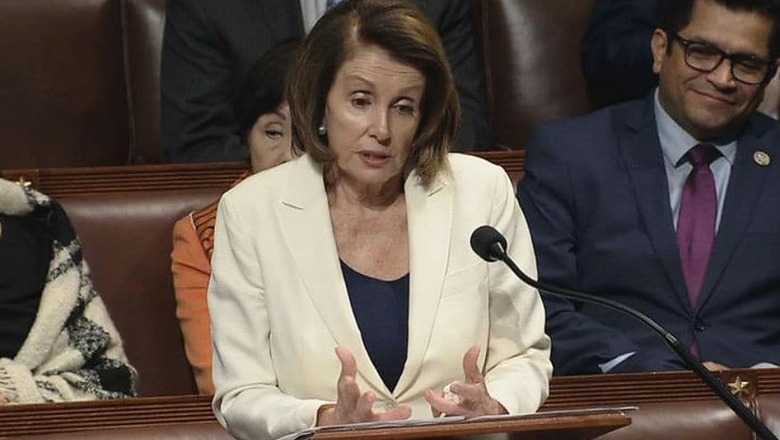
views
Washington: Lawmakers must pass legislation easing "abhorrent conditions" facing children held at the southern border, House Speaker Nancy Pelosi said Monday as she tried taking the offensive on an issue that badly split Democrats and has raised questions about their unity on other issues.
Pelosi, D-Calif, tried rallying Democrats against a common foe Republicans led by President Donald Trump less than two weeks after a USD 4.6 billion border bill drove a bitter rift into her party.
Although the measure passed Congress easily and became law, many House progressives and Hispanics voted "no" because they said the measure lacked real controls on how the government must handle children, while the party's moderates and senators said the measure was the best compromise they could craft with the GOP-run Senate.
In a letter to colleagues returning from an 11-day Fourth of July recess, Pelosi said Democrats must lead "a Battle Cry across America to protect the children."
Citing another fight over blocking a citizenship question Trump wants added to the 2020 census, Pelosi said, "In both the case of the Census and the abhorrent conditions for children and families at the border, we must hold the Trump Administration and the GOP accountable."
Although divisions within both parties are common, seldom are things as openly nasty as when the House approved the border legislation. Progressives accused moderates and their own party leaders of blindsiding them and caving to demands by Senate Majority Leader Mitch McConnell, R-Ky, while Senate Democrats and centrists said liberals had implausible expectations for what could be produced by divided government.
"I think people are going to be walking on eggshells," Rep. Josh Gottheimer, D-NJ, said Monday about the mood he expected when lawmakers return Tuesday.
He also said he'd spoken to an ideological range of colleagues over the break, and they'd expressed a "need to come together and get things done." Gottheimer and other centrist Democrats had rebelled and prevented Pelosi from holding a vote to add care requirements for children to the $4.6 billion package, enraging progressives.
The bitter feelings suggest that it might be hard for Democrats to band together on upcoming bills, including an annual defense policy bill that liberals are often reluctant to support.
"I think this is going to extend into other debates as well," said Rep Mark Pocan, D-Wis, a progressive leader. He said the defense bill "is not going to be a picnic" and noted that many progressives routinely oppose the defense legislation.
The rift seems certain to be discussed when House Democrats hold a weekly closed-door meeting on Wednesday.
"At the end of the day, it's the red team or the blue team, and we'll have to figure out how to get along," said Rep Lou Correa, D-Calif, a leading moderate and member of the Congressional Hispanic Caucus.
While Pelosi's letter didn't promise action on any particular bill, she highlighted several measures that liberal and Hispanic Democrats have pushed.
These included proposals barring the separation of families unless it is to protect children, requiring specific standards of care like thorough medical screenings, and limiting how long unaccompanied children may be kept at temporary holding facilities, many of which are overcrowded.
Congress approved the legislation at a time when the number of migrants entering the US across the southwest border with Mexico surged above 100,000 monthly, the highest levels in years.
Federal agencies' facilities, designed for much smaller influxes, have been overwhelmed as the government detains them and the Trump administration enforces strict policies aimed at discouraging others from coming.
The sharp elbows also echoed over the weekend.
Pelosi told The New York Times that four freshmen who were the only Democrats to oppose an earlier version of the border bill "have their public whatever and their Twitter world" but "didn't have any following." Rep. Alexandria Ocasio-Cortez, D-NY, one of the four rebels, tweeted in response, "That public 'whatever' is called public sentiment."


















Comments
0 comment